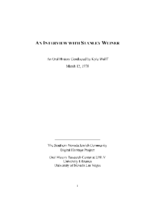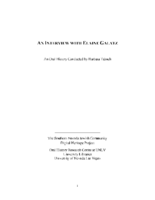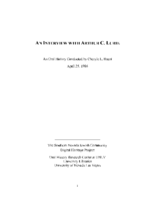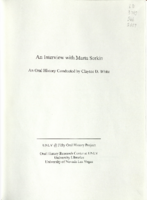Search the Special Collections and Archives Portal
Search Results

Transcript of interview with Stanley Weiner by Kyle Wolff, March 12, 1978
Date
Archival Collection
Description
Interview with Stanley Weiner by Kyle Wolff on March 12, 1978. In this interview, Weiner begins by talking about his father's employment, and then his own series of jobs, including as a department manager at Sears. He discusses living in different parts of town, population growth, educational opportunities, transportation, and recreation. The interviewer asks specific questions about sports, hotels, unions, and the weather.
Text

Transcript of interview with Elaine Galatz by Barbara Tabach, April 22, 2015
Date
Archival Collection
Description
Interview with Elaine Galatz by Barbara Tabach on April 22, 2015. In this interview, Galatz talks about growing up in Wisconsin. She attended the University of Wisconsin where she was an English major and active in Hillel and the Sigma Delta Tau sorority. She met her husband, Neil, while traveling through Las Vegas on several occasions, and sparks finally flew when she visited him in Tucson on a whim. She describes Neil's background in law, moving to Las Vegas together, and her job teaching second grade. She describes the small Jewish community in the 1960 including the Katzes, Brookmans, Freys, Molaskys and Greenspuns, and the current direction of the Jewish Federation. Galatz discusses raising her children, some of the cases that Neil worked on, their group of friends, and her love of horses.
Elaine Galatz was raised on a farm outside Madison, Wisconsin. Her father was a Russian immigrant father and her mother a young American born bride. Her father died when she was a teenager and her mother remarried a man who enjoyed gambling and that would lead her to first encounter with Las Vegas. Las Vegas would coincidentally become the center of her life when she and her husband of 51 years, Neil Galatz moved here in 1961. Elaine taught school briefly and worked in Neil's successful law firm for a number of years. Neil was a significant litigator in the MGM fire and PEPCON explosion cases. The couple also shared in the growth of Las Vegas Jewish community. Elaine served as Jewish Federation president, the second woman to hold that office. Among their favorite shared family activities was a love of Morgan horses, which continues to present day for Elaine.
Text

Transcript of interview with Rabbi Sanford Akselrad by Barbara Tabach, October 29, 2014
Date
Archival Collection
Description
Sanford Akselrad is the rabbi at Congregation Ner Tamid. In this interview he describes his rabbinical training, coming to Las Vegas, and the growth of the congregation.
More inclined in his youth to pursue a career as a scientist than rabbi, Sanford Akselrad (1957- ) became the rabbi at Congregation Ner Tamid in 1988. Turning his tenure, Rabbi Akselrad has lead the congregation through its move from Emerson to Street to its permanent home on Green Valley Parkway and I-215 and shares a fun story about buying desks and chairs from the Clark County School District. He talks about many of the milestones including: Project Ezra which he started during the 2008 recession to help Jewish community members find jobs; the NextGen program which was initiated to bring young adults in their twenties and thirties back to the temple. For over twenty years Rabbi Akselrad was a member of the board of the Nevada Governor?s Council on Holocaust education, a topic that was the focus of his rabbinical thesis. He was the founding president of the Clark County Board of Rabbis and has served on the boards of the Jewish Federation of Las Vegas, Jewish Family Services, and the Humana Hospital Pastoral Advisory Board. He was also the chair of the Federation?s Community Relations Council (CRC). Rabbi Akselrad is a board member of the Anti-Defamation League Nevada region office and the Interfaith Council of Southern Nevada. Sanford Akselrad was born on October 6, 1957 in Oakland, California and raised in Palo Alto. He attended the University of California, Los Angeles and then went to graduate school at the Hebrew Union College Jewish Institute of Religion. He spent the first year of his graduate program in Israel, the next two in Los Angeles, and the final two years in Cincinnati, Ohio. Rabbi Akselrad met his wife Joni in Reno, Nevada and married her during his third year of rabbinical school. The couple has two children, CJ and Sam. After his ordination in 1984, Rabbi Akselrad was associate rabbi of Temple Israel in Columbus, Ohio, one of the largest Reform congregations in the Midwest. His choice of career was inspired by his father, Sidney Akselrad, who was a prominent rabbi involved in social justice issues and the Civil Rights Movement. Sanford Akselrad has followed his father?s example of community involvement, both in Las Vegas and on a national level: he served on the board of the National Conference of Community and Justice (NCJJ), he was chair of the NCJJ's Inter-faith Council, and he is active in the Union of Reform Judaism (URJ).
Text

Transcript of interview with Arthur "Art" Lurie by Cheryle Bacot, April 25, 1986
Date
Archival Collection
Description
Interview with Arthur "Art" Lurie by Cheryle Bacot on April 25, 1986. Lurie talks about his family and upbringing with Kenny Washington, who was the first African American to sign with the National Football League. Lurie discusses knowing everybody in Las Vegas in the 1950s, being in the service/retail sector and watching the city grow. He operated several businesses including grocery stores and the liquor department at Wonder World. He talks about his love of boxing, serving on the boxing commission, and advantages of living in southern Nevada.
Arthur C. Lurie lived in Las Vegas for 33 years at the time of this 1986 oral history. He and his wife Eleanor had relocated from Los Angeles area to help run his brother-in-law's food market. Over the years his career would include the grocery, bar (Art's Place) and restaurant businesses; including being co-owner of the liquor store at Wonder World. He shares memories of adjusting to the more laid back culture of small town Las Vegas and how he feels like a native after watching the city grow over the past decades. Art was a founding member of Temple Beth Sholom, where he served as an early vice-president. Being in the non-gaming sector provided gave him the opportunity to work with youth programs and he started the Golden Gloves gym in Las Vegas. He judged over 40 title fights and had a long career on the Nevada Boxing Commission. Arthur Lurie past away in 2014 at the age of 96.
Text

Transcript of interview with Blaine Benedict by Barbara Tabach, November 12, 2015
Date
Archival Collection
Description
Throughout this interview, Blaine shares stories of his father, Alvin Benedict. Al owned and operated Benedict and Remy Plumbing Business for a few years before entering into casino management. He is considered to be the first college educated executive and had an illustrious executive career at the MGM. He also was a co-founder with Susan and Irwin Molasky of Nathan Adelson Hospice.
Text

Transcript of interview with Sharon Walker by Barbara Tabach, October 8, 2014
Date
Archival Collection
Description
Sharon Walker is a real estate investor, retired stockbroker and former loan officer. She was born on December 8, 1949 in Toledo, Ohio, and moved to Las Vegas with her family in 1963, where they started Walker Furniture, a store which they later sold to the Alterwitz family. Sharon's father, Julius Walker, was also in the casino business, becoming an owner of the El Cortez Hotel and Casino with Jackie Gaughan. Her mother, Anne Walker was a founding member of the first local Hadassah, The Women?s Zionist Organization. Sharon continues the family tradition of being active in Hadassah as well as being a Board Member of Jewish Family Service Agency. In November 2014 she was an honoree of Hadassah Leadership. In this interview, Sharon describes her adolescence in Las Vegas and the differences in culture as compared to her childhood in Toledo, Ohio. She also recalls the Walker Furniture business, her father?s careers, and her uncles Ed ?E? Walker and Lou ?Paddock? Walker.
Text

Transcript of interview with Lovee duBoef Arum by Barbara Tabach, November 1, 2016
Date
Archival Collection
Description
Lovee Arum is the Chief Financial Officer of the Morris A. Hazan Family Foundation and Director of Hospitality for her husband Bob Arum?s boxing promotion company Top Rank. She holds a Nevada Real Estate Broker Sales License and was a partner in Western Linen (a Las Vegas linen rental and laundry company) for many years. Arum is a volunteer and philanthropist in the Las Vegas, Nevada community and works with organizations such as Temple Beth Sholom and the Nathan Adelson Hospice. In this interview, Arum reflects upon her childhood in Beverly Hills, California, and first experiencing Las Vegas after her father, Morris Hazan, established Western Linen. She discusses adjusting to Las Vegas life after moving to the city with her first husband, Larry duBoef, in 1963, and raising her daughter and son within the local Jewish community. Arum also talks about meeting her current husband, Bob Arum, and her various philanthropic activities, including Junior League, United Jewish Appeal, Keep Memory Alive and establishment of the Lou Ruvo Center for Brain Health.
Text

Transcript of interview with Renee Diamond by Barbara Tabach, November 20, 2014
Date
Archival Collection
Description
In this interview, Renee Diamond discusses coming to Las Vegas via Los Angeles, with her husband and children in the 1970s and getting involved in politics. She talks about her husband, Leo, and his business selling vinyl records in L.A., and her work in a doctor's office. Once in Las Vegas, the Diamonds joined Temple Beth Sholom and later Congregation Ner Tamid. Renee talks about her involvement in the political arena in southern Nevada, including the League of Women Voters.
Community activism and social justice rank high in the legacy of Renee Diamond. She often refers to herself as one of the last of the generation without college degrees that could make a difference in the politics of the state. When Renee, her husband Leo Diamond moved their family to Las Vegas from southern California, the energetic advocate Renee quickly plugged into the community. The word "No" was not part of her vocabulary. Among the many Jewish and secular activities the she engaged in were: the editorial board of the Jewish Reporter newspaper; Hadassah; Anti-Defamation League; Red Cross Board; State Museum Board to name a few. She remains a vibrant Democratic Party leader and served one term on the Nevada Assembly in 1989. She was on the front lines as a fierce and active supporter of Welfare Rights, Fair Housing and the Equal Rights Amendment. It is a life that included working alongside illustrious women and men of Southern Nevada history. A list that includes: Harriet Trudell, Ruby Duncan, Myrna Williams and Dorothy Eisenberg and many more mentioned here. Meanwhile she raised four children and enjoyed a loving 43-year marriage with Leo (aka "Uncle Leo") whose career included the popular Bingo Palace, Slots-A-Fun and Stations Casinos. During this oral history interview she recalls the Las Vegas that she moved to in 1972 and reflects on what attracted people here, ways to be part of the Jewish life which might even include a bowling league and how involvement in raising social awareness was a worthy investment of ones' time. This is a look at a woman who made a difference.
Text

Transcript of interview with Marta Sorkin by Claytee White, March 2, 2009
Date
Archival Collection
Description
In this interview, conducted for the 50th anniversary of UNLV, Marta Sorkin discusses her family and her experience moving to California, and then to Las Vegas. Sorkin worked at the James R. Dickinson Library at UNLV and later in Lied Library, helping to implement and update various databases, and create displays on current topics. She briefly discusses her involvement with Hillel and the Jewish Federation of Las Vegas.
Marta Sorkin begins by reminiscing about her childhood in Far Rockaway Long Island, New York. She details the life her parents lived, which set an example for Marta and her two siblings. Through hard work, advanced education, and involvement in causes that were important to them, they created the template by which Marta lives her life. Marta describes her early work history, which included modeling, sales, library work, and working part time in her father's dry-cleaning plant. She and her daughter were living with her parents for a time in California, and they visited Las Vegas on weekends. It was during one of those visits that Marta met her second husband-to-be. They eventually married and decided to settle in Las Vegas. In Las Vegas, Marta enrolled at UNLV, became involved with the Preservation Association of Clark County, and volunteered at the Jewish Federation of Las Vegas. In addition, she completed her BA and MA degrees at UNLV and started working at the university's library. She details her work there, including creating display cases, working in the reference section, doing research for students and faculty, and compiling interviews. Marta also describes the fundraisers she spearheaded to help raise money for the various societies she was involved with: non-events, pancake breakfasts, dinners, and dance and band performances. In her closing comments she mentions an interview she did for Ralph Roske's class and expresses her appreciation for the career she's had at UNLV.
Text

Transcript of interview with Hershel Brooks by Barbara Tabach, December 8, 2016
Date
Archival Collection
Description
Hershel Brooks was born December 3, 1930 in Brooklyn, New York. He was raised in an orthodox Jewish household, along with his four siblings, and attended Jewish community schools before pursuing his rabbinical studies. He studied at TelsheYeshiva in Cleveland, Torah Vodaath in New York, and Jewish Theological Seminary in New York. Before assuming his first rabbinical position, Brooks married his wife, Alma, and graduated with his BA from the University of Miami. He was first hired by a conservative congregation in Miami, and subsequently led congregations in Savannah, Georgia, Greensboro, North Carolina and Philadelphia, Pennsylvania. Eventually, he joined a temple in Anaheim, California, where he served for twenty years. In 1996, Brooks retired to Las Vegas. He was soon asked to lead services at Temple Bet Knesset Bamidbar [BKB] twice a month as its rabbi. He still is active at BKB, though he retired in 2011. In this interview, Brooks reflects on his family background and the path that lead to his becoming a rabbi in the Conservative Jewish Movement. He talks about his career, including his involvement with BKB as well as other Jewish community service, including facilitating adult bar mitzvah classes and serving on the local Rabbinical court of Judaism, known as Bet Din.
Text
